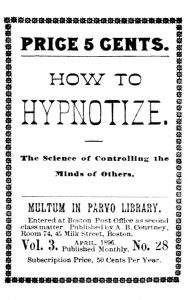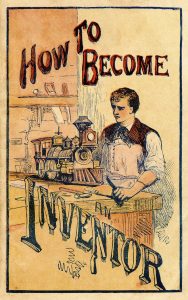eBook available: How to Hypnotize

Another item from our Digital Library has been converted to a free Project Gutenberg eBook by the Distributed Proofreaders project. How to Hypnotize: The Science of Controlling the Minds of Others is the twenty-eighth volume of the Multum in Parvo Library, a collection of tiny 16-page chapbooks covering a variety of topics.
While this book’s title might bring to mind either villainous manipulation or humorous showmanship, it is actually focused on therapeutic mesmerism, containing suggestions on using hypnosis to treat illness. Much (possibly all) of its content appears to have been lifted without attribution from James Coates’ longer work, How to Mesmerize.
Given the book’s small size, brief length, and frequent commercial interruptions, it doesn’t provide very much information on its stated topic, but it remains an interesting example of late 19th-century novelty publishing (and trans-Atlantic piracy of text).
The entire book can be read online or downloaded in commonly-used eBook formats through Project Gutenberg.



 Another one of dime novel publisher
Another one of dime novel publisher 



